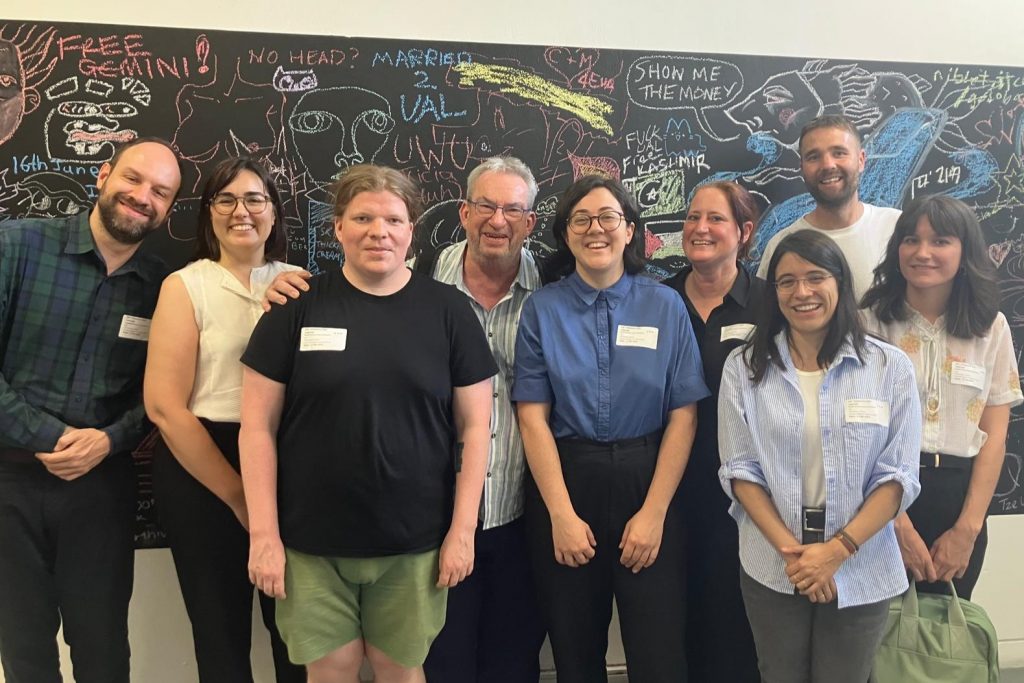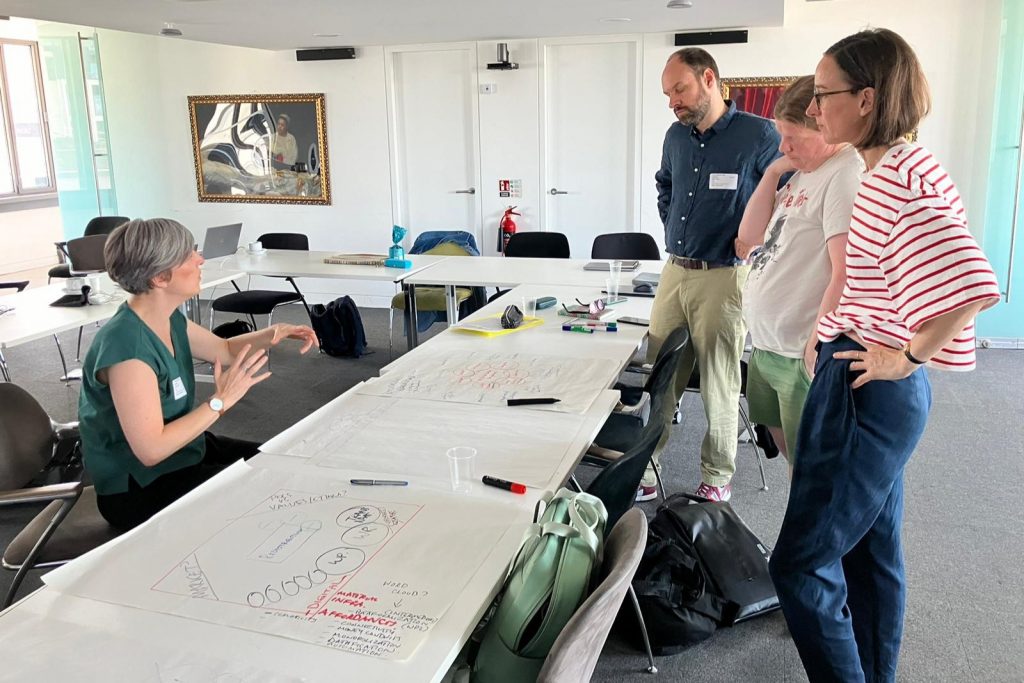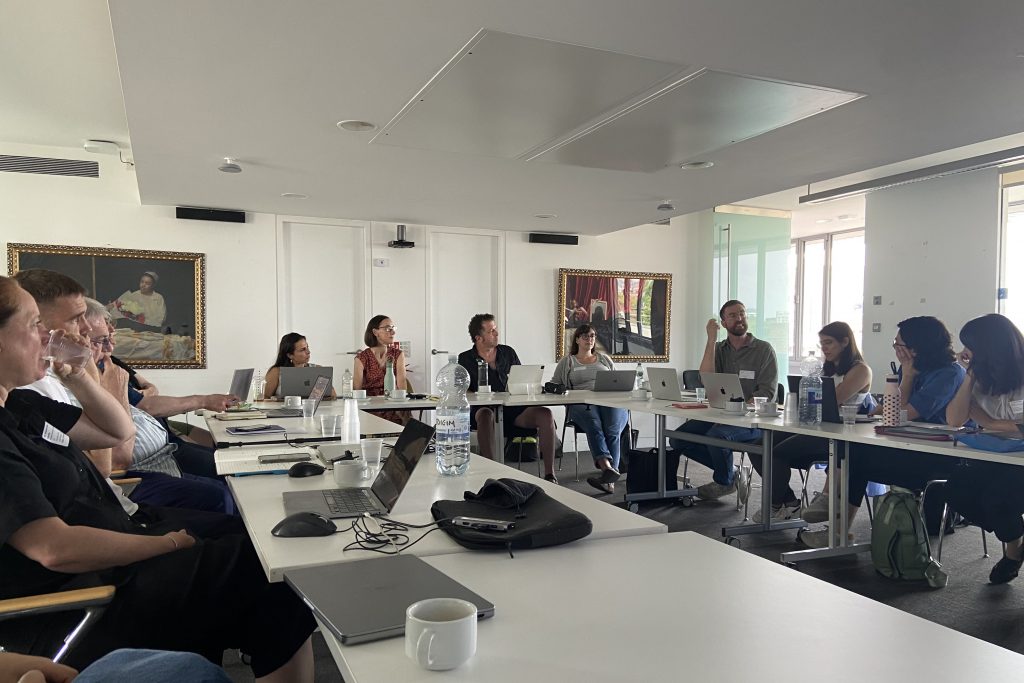
NEWS


NEWS
Published
Dr Ona Anglada Pujol (Postdoctoral Researcher at the Universitat Pompeu Fabra) discusses the fourth ReDigIm consortium meeting which was held in London on 16-17 June 2025.

London greeted us with unexpected heat for our fourth (and last) consortium meeting. After our previous gatherings in Lapland, Barcelona and Zurich, it was time to reconvene at the University of the Arts London (UAL) – which is home to our project leader, Rebecca Bramall – for the final stretch of the project. Between the 16th and 17th of June, all five national teams came together to reflect on the work done so far and to begin shaping the closing phase of ReDigIm. As we approach its conclusion, the meeting was a great opportunity to revisit our findings, discuss dissemination strategies, and gather feedback from colleagues.
Our base was the London College of Communication at UAL, which was buzzing with activity as it hosted its end-of-year shows. We were lucky to coincide with the Screen exhibition, where graduating students from BA programmes such as Animation, Games Design and Virtual Reality showcased their work throughout the building. On our way to the meeting room, we passed through corridors filled with great interactive installations, games and short films.
We opened the first day of work with an exercise focused on the findings from our final phase of work which aims to synthesise the redistributive imaginaries we have identified and to develop future scenarios of digital prosocial contribution. With all the seven imaginaries we have mapped out, we divided ourselves into small groups to reflect on one of the main research objectives of our project, which is to understand the role of the digital in redistributive imaginaries. We were fortunate to be joined by Emma Dowling, Assistant Professor of Sociology at the University of Vienna, and a member of ReDigIm’s advisory board. Emma joined our discussion and provided insightful feedback and ideas that helped us to refine our findings.
Later in the morning, we took on a more visual challenge: could we map the seven redistributive imaginaries onto a single diagram? Armed with large sheets of paper, pens and post-its, we broke into groups and explored how to represent the complexity of our findings in a way that would be clear, engaging, and accessible to broader audiences, without flooding the diagram with too much information.

After lunch, we welcomed John Clarke, Emeritus Professor of Social Policy at The Open University, and a member of the advisory board. We dedicated the afternoon to discussing the upcoming stakeholder workshops. Each national team will organise a workshop later this year, aiming not only to share results but also to spark dialogue and gather input from key actors. The sessions helped us to refine the objectives and activities of the workshops and to identify possible invitees.
The second day was devoted to the presentation of working papers by the national teams, which offered an overview of our findings and analysis. We were lucky to be joined again by John Clarke along with Michael Vaughan (Research Fellow, London School of Economics), Jeremy Gilbert (Professor of Cultural and Political Theory, University of East London) and Irida Ntalla (Senior Lecturer in Communications and Media, UAL). The morning featured presentations from Isa Villegas Simón and Mercè Oliva (Spanish team), who discussed how the promise of visibility shaped civil society groups’ use and understandings of digital platforms and tools. Jon Paylor, from the UK team, complicated established accounts of crowdfunding. The Swiss team presented two papers: Kathrin Ottovay discussed how a grassroots initiative in Switzerland that helps asylum seekers redefines notions of redistribution, while Moritz Ege focused on the redistributive imaginaries embedded in the Swiss app Twint. Keijo Lakkala, from the Finnish team, explored the notions of utopia and dystopia in the context of redistribution in Finland. And right before lunch, I had the opportunity to present a collaborative piece we developed with Jon, Isa and Rebecca for the Connective (T)issues workshop organised by Data & Society in March earlier this year, in which we experimented with a video format to convey some of our findings.

After lunch, Milana Cergic discussed the Montenegro team findings in relation to dynamics of digital inclusion and exclusion in Europe, and Janne Autto, from the Finnish team, revisited the findings of the working package one (focused on press discourses) through the lens of the Actor-Network Theory. The presentations were a great opportunity to explore the findings of each national teams through different lenses and perspectives.
To close the working day, we were invited to a handling session organised by UAL’s Archives and Special Collections. Archivist Georgina Orgill had curated a fascinating selection of materials from the Stanley Kubrick Archive: early script versions of 2001: A Space Odyssey, annotated copies of The Shining novel, poster drafts for the film, and even the original papers that Jack Torrance types (the well-known ‘All work and no play makes Jack a dull boy’) in English, Spanish and German. We also had the chance to explore archival material related to the Elephant and Castle neighbourhood, where the university is situated, which provided a rich insight into the history of the area surrounding the university and its transformations.

We ended the consortium meeting with a rooftop dinner in Peckham, enjoying a stunning view over the London skyline. Good food, good wine, and even a touch of nostalgia: the principal investigators dug into their inboxes to find the very first email exchange that kicked off the ReDigIm project. It was the perfect setting to reflect on how far we’ve come, from that first email sent in March 2021 to a sunset in June 2025 in London.